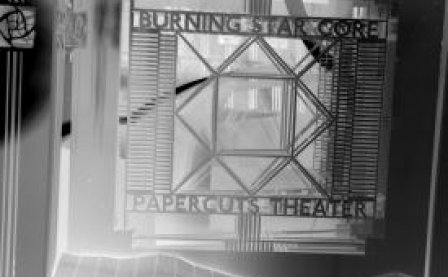So, “noise” is cool now, or at least getting cooler by the day. I’m no grizzled veteran, so perhaps I’m in no position to cast stones, much less go unscathed by their bombardment, but nonetheless I have qualms with the manner in which its ascendance has come about. And to chop my legs off even further, the very pedigree of noise might preclude those qualms. First off, noise is an incredibly lazy term, one I was once guilty of improperly ascribing, and currently am guilty of using in an offhand manner (“It’s called noise, Mom”). The word is at once reductive and repulsive, a bratty epithet used to inform the world your tastes are so refined (debased?) that you enjoy auditory detritus. And, to wit, many “fans” wouldn’t disagree with that assessment, in which case the joke isn’t on straight-laced bourgies, Sal -- it’s on you.
Sadly, ‘detritus’ isn’t an unfair assessment of much of the noise universe, which is indeed my second aspersion. I have nothing but respect for the countless number of Midwestern disillusioned huddling in their quarantine taking Jimi Hendrix and whatever noisy punk their cousin listens to “to the next level.” It’s more than I’ve done, and it sounds like fun. But just because you and your friends are proud of it doesn’t mean it has merit. Somewhere along the line, this tradition that descends to us via modern composition and free jazz and performance art has become a bastion of unexamined mediocrity. There is so much indistinguishably flaccid music farted out every day that is heralded by the community as to make that community farcical, devolved into a mutual admiration society. The aspect of noise’s pedigree that likely makes this merely an embittered rant are its roots in punk, an all-inclusive-fun-times movement. And, in the end, it seems that’s what “noise” is. A reversion to punk, a revision christened at No Fun Fest 2007. So it is that I’ve convinced myself that what I’m an appreciator of is “avant-garde,” a meaningless moniker, more or less, only indicating progress and forward thinking. But, fuck, what an asshole you sound like whenever you declare yourself a fan of The Avant-Garde; still, I have to affix myself, at least in my own mind, to something with some sort of an intellectual underpinning.
Oh right, this is supposed to be a review, not merely a self-satisfied crucifixion of something I generally think positively of. So, I hold up Burning Star Core, C. Spencer Yeh’s project, as an example of an entity that upholds all the criteria I ascribe to my ideal. Philosophically, I don’t know Yeh from Adam, but his output belies a scrutinizing attention to detail and a cognizant attempt to push himself beyond the jejune. His oeuvre is one of the most stylistically diverse I have come across; on this album alone, he constructs a texturally complex drone accompanying violin, a haunting collage of voice and electronics and field recordings, a kinetic pastiche reminiscent of Aphex Twin’s “Bucephalus Bouncing Ball,” and a free jazz set.
Yeh’s talents extend beyond violin, collage, improvisation, and composition into experimental/non-linguistic vocals, laptop-ism, and harsh noise. He synthesizes those forms and imbues them with a humanity they so often lack on their own. For the open-minded, this universe of music has undeniable appeal: at its best it is free form, abstract, and difficult, and a common allure is outward exclusivity (elitism is not a stranger). For the many they may enchant, these very properties can lead to an eventual departure from the fold, leaving one wondering about its validity. And as asserted, the corpus stinks of amateurish hucksterism, but after all, what art form does not? This record is a redemptive piece, a reward for having clawed through the moldering heap and with any luck will bolster the wavering fortitude of the discouraged.
While I grade this album with a perfect score, I feel some of the antecedent releases actually surpass it in quality, but stylistically they are cut of the same cloth. Sharing a 2005 vintage Let’s Play Like Wildcats Do and the magnum opus The Very Heart of the World were a pitch-perfect distillation of many disciplines of the avant-garde. All three of them are alike in their united disparity and sheer inventiveness coupled with extreme listenability. Surely, they are nothing you would want to call noise.
More about: Burning Star Core




